Sunday, April 30, 2006
Cuba - Old, bold and beautiful
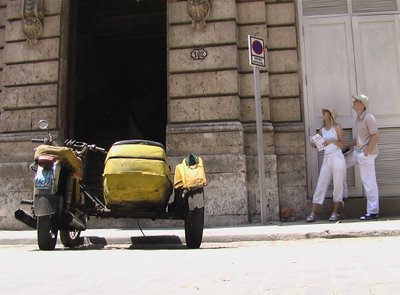
Montreal (April 18, 2006) - Another midnight drive to the airport and a wait in the airport for the 7 am flight, made bearable only because we got to sleep in the airport lounge.
We touched down at Veradero on the north shore in the afternoon and in the customs Vina had to part company with 2 oranges and an apple which she brought along.
A luxury bus took us through Mazatlan to Jibacoa our destination on an excellent highway, better maintained than most national highways in India.
The Jibacoa resort is further west of the expansive resorts in Veradero and about 1 hour east of Havana. While Varadero has white sandy beaches the twin resorts at Jibacoa are more seculuded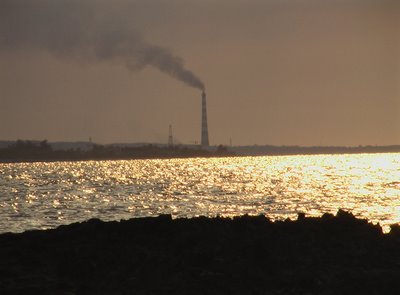 with shallow corals just off the white sandy beach.
with shallow corals just off the white sandy beach.
The easy access to snorkelling and Havana is what attracted us to Jibacoa.
The entry road to Jibacoa snakes its way between two small hills and arrives at the single storey structure that houses the reception, bar, and the small indoor recreational area.
Our room was being cleaned so we were asked to wait here a while. We went to the bar to get ourselves drinks, and walked out the back exit where it opens up to the beach. It was a most welcome site - the sand and the blue sea. We could see the dark patches were the coral reefs were.
There was a low hill off to the right and another one behind the resort and parallel to the beach. Our restort shared the beach with another one called the Breezes Jibacoa. Just off the tan to white coralline sand beach we could see the dark patches of coral.
The first day we relaxed and luxuriated in Jibacoa. The food was not as spectacular as some of the other resorts, but there was enough of a variety. It was tasty although a bit bland.
It was interesting to see a slightly different attitude in the Cuban waiters and staff as compared to the other resorts in DR and Mexico. The Cubans seemed to always measure you up. Their attitude was not one of universal friendliness but one of "symbiotic fraternity" for lack of a better word. They seemed to say - "Let us help each other by being friendly." Later even when we met several other Cubans in Havana, we noted this more business like, and egalitarian treatment of tourists which made our interaction with people there so much more interesting. Also the fact that each Cuban had strong individual traits and a different approach to even something as univeral as street vending... but more of that later.
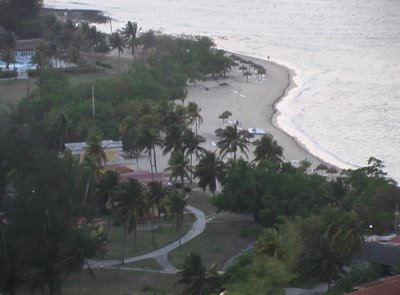
On the second day we did more snorkelling and kayaking. The highlight of the day was that Vina got scraped by some shallow coral off the beach and I finally found her at the 2-room nursing station. The doctor seemed highly educated but could barely speak English. He recommened some ointment and tablets which we were supposed to buy. But Vina fished out of her sizeable medical emergency bag which she had brought along with her all the way from Canada, what she thought was a suitable equivalent of the recommended medicine. The doctor was very impressed by this.
We hatched plans to make trip to Havana the next day, stay at a Casa Particular (a bed and breakfast) for a night, and head back to the resort the next day evening.
lOne of the waiters in the dining hall had made a business proposition whereby his friend would come down to pick us up from Havana and drive us there, but we had declined, much to his consternation. We planned to use the local bus, rather than a comfy rented car, but the only buseaving Jibacoa resort wa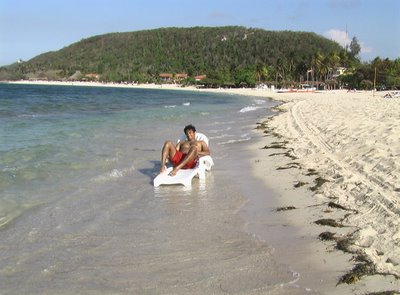 s a worker bus leaving at 8 am., and that too only to the next town 25 km. away. We had to then find our own transportation to Havana from there. We were undaunted by all this, but what concerned us greatly was that we had to get up at 7 am in order to be aboard the bus at 8.
s a worker bus leaving at 8 am., and that too only to the next town 25 km. away. We had to then find our own transportation to Havana from there. We were undaunted by all this, but what concerned us greatly was that we had to get up at 7 am in order to be aboard the bus at 8.
And not being morning people (especially on vacations), we found ourselves in a rented car offered by the resort ($60 US) with a driver and his companion heading to Havana the next day at 9 am. It was a pleasant journey, the road dotted with brand new drilling wells that Castro had installed, apparently with the help of the Chinese, that would enable him to no longer depend on tourists like us to fuel his foreign currency requirements.
Our companions were cordial but not overtly friendly.
As we neared Havana the traffic became more interesting with old dilapidated cars and modern busses. Large billboards appeared with interesting messages in Spanish - "Several countries have a high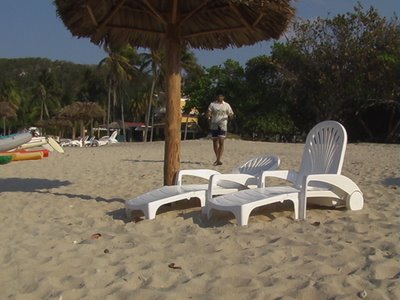 percentage of illiterate children, but Cuba is not one of them. Here 100% of our children are educated."
percentage of illiterate children, but Cuba is not one of them. Here 100% of our children are educated."
Soon we were in Havana, and the traffic and buildings became spectacular. Ancient cars vied with large ancient buildings for our attention. Imagine the grand edifices in Paris and age them about 50 years and you have Havana. Overall the roads, people and buildings gave a distinctly Indian feel to our expedition, but, of course, with far fewer people.
While driving down the main roads the urban decay was not visible, but as the c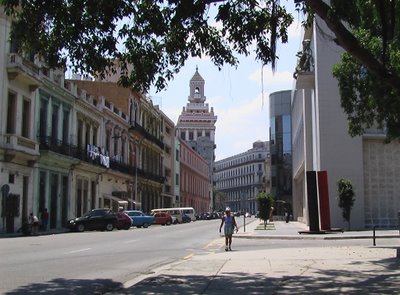 ar turned into the road where our Casa particular was located, the narrow road, garbage on the sides and the open drain looked like the lower class neighbourhood of any Indian city. The Casa particular itself, though was nice, and so was the interior. The ladies who greeted us (mother and daughter) were pleasant and turned out to be great hosts.
ar turned into the road where our Casa particular was located, the narrow road, garbage on the sides and the open drain looked like the lower class neighbourhood of any Indian city. The Casa particular itself, though was nice, and so was the interior. The ladies who greeted us (mother and daughter) were pleasant and turned out to be great hosts.
We parked our bags and immediately set out to explore the city. We were close to the old part of Havana and everything was within walking distance. We walked down the wide bustling concrete promenade at the center of the City called Paseo del Prado, along side which were old dilapidated buildings, modern cigar shops, popular hotels, newly renovated and painted facades of restaurants, and a grand concert hall (Grande Teatro de la Habana) where we saw a ballet competition later that night.
For now though we headed to the Museo de la Revolucion, the former house of Batista, the deposed premier of Cuba. Inside the museum were artifacts from the war. There w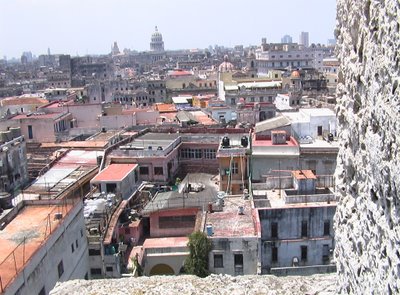 ere Batista's house hold items, revolutionary literature, newspapers cuttings, weapons, personal belongings, and photographs of the ubiquitous prince of the revolution,
ere Batista's house hold items, revolutionary literature, newspapers cuttings, weapons, personal belongings, and photographs of the ubiquitous prince of the revolution,
Che, whose charismatic face is splashed accross Havana, even more than Castro. Also in the Museum are documents and proclamations that seek to amend history and make corrections to the widely held western belief that they are not altogether evil, including a caricature of Bush the Idiot (the senior, not the junior). Right infront of the museum is the historic tank which was used in the battle to oust Batista and beyond it is a wide concrete walkway stretching to the distant blue sky, a strip of sea and the green hill side of an island.
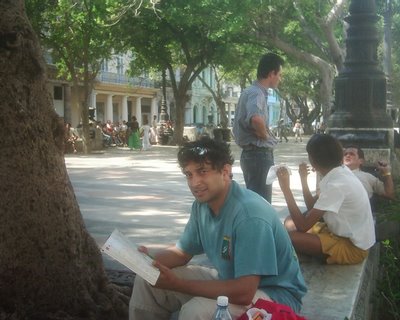
Behind the museum is a structure housing boats, army vehicles, a plane and other remains of the revolution, carefully guarded and displayed.
We walked to the main bazaar from here - the Calle Obispo. This is a pedestrian only narrow street on either side of which are restored buildings, government offices, shops and restaurants. The sight from one end to the other is breathtaking, with colorful Cubans, tourists, and various street side vendors.
We as foreigners have to pay in foreign peso where 1 foreign peso = 1 US dollar, and the locals pay in their local peso which is about 1/40th of the US dollar.
The govenment has apparently clamped down on aggressive vendo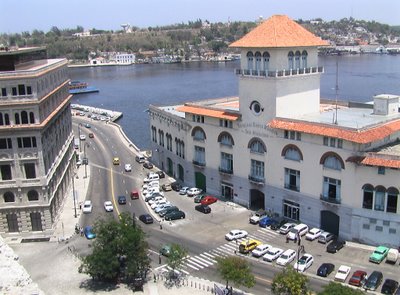 rs and at night every street corner had a couple of policemen in plain view. Thus it is very safe and hassle free. Interestingly the Cubans are not needy, and in fact we were only discretely approached, maybe 4 or 5 times by people looking to sell stuff. We were solicited in a unique business like fashion, rather than the straightforward pitch that is common to other touristy areas.
rs and at night every street corner had a couple of policemen in plain view. Thus it is very safe and hassle free. Interestingly the Cubans are not needy, and in fact we were only discretely approached, maybe 4 or 5 times by people looking to sell stuff. We were solicited in a unique business like fashion, rather than the straightforward pitch that is common to other touristy areas.
While walking through Plaza Vieja - an area with churches, and museums the next day we were approached by a middle aged man in an old suit and a hat who spoke in perfect english (almost a refined British accent) and said, "I am a historian, and if you are interested in learning about these buildings, I can be your guide." I instinctively said, "No thanks." And barely had I said it, he departed. He must have been an educated and intere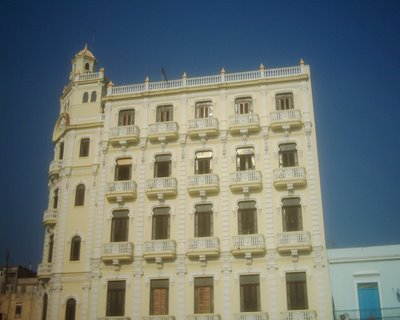 sting man.
sting man.
There was another old lady, clad in colorful blue and white with a gigantic cigar protruding from her mouth. While I was taking video on the sidewalk, she just approached us and smiled. No words were needed, but it was an invitation - "Here, take my photo and I wouldn't refuse a small gift". I turned away, and in an instant she had moved on.
That evening we walked to the Malecon which is like a walkway fronting the sea. There are people here fishing off the rocks below, sitting on the wall or some kids playing. One guy caught a fish... some kind of a flat fish that was wriggling. He let Vina hold it for a photo, and said, "Dont worry, I didnt see anything." There was another young girl that Vina spoke to in Spanish who asked where we were from. She asked if we had soap.
After sun set, we walked to the Grand Theatre to watch a ballet performance. We met an east german guy there, who was overtly friendly and chatty. He said this place reminded him about how his old country used to be. He probably felt comfortable there, even though at 6.5 feet and in shorts and backpack he stood out from the dark skinned crowd.
For dinner we went back to Called Obispo where we had Chinese food. It was late and we met a very intersting person here. His job was to drum up business for the local chinese restaurants by wearing a red gown and being a chinese wizard. I invited him for beer, and heard from him the sto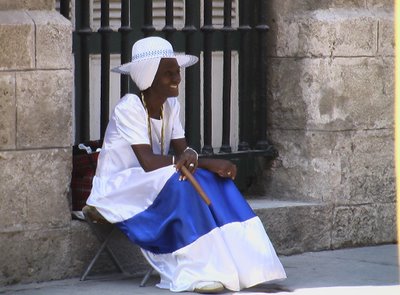 ry of the real Cuba. He was not scared to talk, because he said the government had become more relaxed over time. There was a time he said when whenever they saw a man talk to a foreigner for any length of time, he was approached by the police later and questioned. They let him off with a warning - "Why do you want to get into trouble?"
ry of the real Cuba. He was not scared to talk, because he said the government had become more relaxed over time. There was a time he said when whenever they saw a man talk to a foreigner for any length of time, he was approached by the police later and questioned. They let him off with a warning - "Why do you want to get into trouble?"
This guy was very smart. He said his sister was even smarter and had wanted to join the Navy. She had the brains for it and passed the tough entrance exam. As part of the training she was supposed to be sent to Poland. But when her name came up she was rejected. Why? Apparently before Castro took over their family had a successful business. With the revolution their property was taken away and they were reduced to lower middle class status like everybody else. So it was reasoned that she might have some animosity towards the government and so would be a prime defection candidate.
Our chinese friend was well aware of Cuba's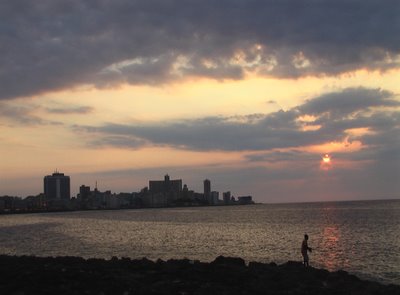 future potential if Castro's communism came to an end. He was also aware of the strong arm tactics used by the US to twist central American politics to suit its ends. What he knew about India most was about Indira Gandhi. She was a friend of Castro and they used to show her on TV. He also remembered the day in 1984 when she was killed and on TV they showed the continuous river of mourners who walked past her body.
future potential if Castro's communism came to an end. He was also aware of the strong arm tactics used by the US to twist central American politics to suit its ends. What he knew about India most was about Indira Gandhi. She was a friend of Castro and they used to show her on TV. He also remembered the day in 1984 when she was killed and on TV they showed the continuous river of mourners who walked past her body.
Late at night we let ourselves into our Casa Particular and got up late for a sumptuous breakfast. We were joined by a French couple with their 2 sons. One of the items on the breakfast table - a tin of chocolate powder - boasted high carbohydrate content, which would have horrified any weight concious New Yorker.
The casa particular had a high ceiling with an inside courtyard where various pets lived together. Our hosts were christians and had a jesus cross in their house.
We headed out to take in some more sights of the old city. It was a warm sunny day and climbing the steep steps of church bell tower to the top of the Abbey afforded a breathtaking view of the city. Looking towards the sea there were new stylish buildings and harbor f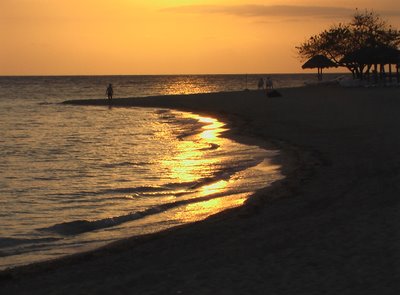 acilities, and looking inland we could see the dishevelled roof tops of crumbling concrete structures stretching into the hazy sky, and in the distance the dome of the parliament house.
acilities, and looking inland we could see the dishevelled roof tops of crumbling concrete structures stretching into the hazy sky, and in the distance the dome of the parliament house.
A few more museums, more enterprising people offering us a peek into a "restricted area" of the museum for a fee, and finally a flea market where Vina could indulge in some real commerce. From there we headed back to the Casa Particular to collect our stuff and embark on our journey home. This time we were adamant about taking local transportation to go back to Jibacoa. We finally located the bus stop and stood in line with other travellers heading east. We waited for the bus to come, and waited some more. It started to get dark. After a long wait the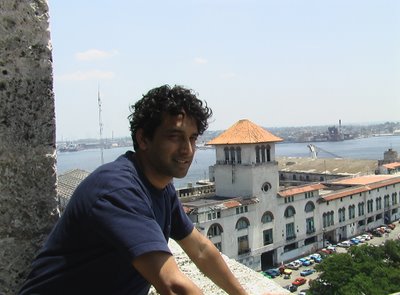 bus came, but then it went into some depot. Our excitement died when we were informed that the bus will take its own sweet time to come out. The sun was setting, and we were losing patience. We inquired about any other way to get back to Jibacoa, and were told that there was no way. But we had been told that a local taxi would take us back to Jibacoa for $40 US/peso. When we asked the locals about the taxi option, they said no way... it costs a fortune... who will pay that. We said, we would, and there was commotion in the long line as people turned around to see who these morons/rich people were. We were told to go near the railway station where there was a long line of dented and dusty cars standing.
bus came, but then it went into some depot. Our excitement died when we were informed that the bus will take its own sweet time to come out. The sun was setting, and we were losing patience. We inquired about any other way to get back to Jibacoa, and were told that there was no way. But we had been told that a local taxi would take us back to Jibacoa for $40 US/peso. When we asked the locals about the taxi option, they said no way... it costs a fortune... who will pay that. We said, we would, and there was commotion in the long line as people turned around to see who these morons/rich people were. We were told to go near the railway station where there was a long line of dented and dusty cars standing.
Once there we made our intents known, and again there was a commotion amongst the stander-byes, and a menacing man approached us and said he could take us for $40. We were uncertain about him, so looked around for any others willing to take us, but there were none. Finally we said OK and he went away to make arrangements.
I looked with uncertainity at his car since I had seen much better and modern cars in a junkyard. But the man came back with an even more menacing man who was to be our driver. Our driver had mascaraed eyes and had a red bandana on his head, like the pirate in Pirates of the Carribbean, and kept looking in all directions rapidly as if he at any moment he expected a bird to swoop in on him and grab his bandana. We paid him $40, and he led us to a car which was even more dilapidated than the one I had thought would be our conveyance, and we set off.
We were told to act like Cubans since this was a private vehicle and it was not allowed to carry foreigners. By the time we negotiated the 100 km. to Jibacoa we had passed several policemen on the way and none of them stopped us. But we were lost and could not find the road that leads to the resort. Our driver had no clue. We finally stopped a car with some foreignerns in it and they said to follow them. But thanks to our ancient car, we lost them. We took a road which I thought led to the resort, but very soon the road ended in a mud road and we encountered cows. So we turned back and the driver parked on the side of the road to walk up to a house in the dark. He came back with a man who said that the resort up the road, and who was happy to accompany us there in the car. We made it back, dusty, famished, tired and needless to say - anxious. From the looks of it even the driver was anxious and we parted ways relieved.

That was our biggest adventure in Cuba. Havana was an unforgettable experience, and the Cuban people we met were deep and unique.
The next day I did a scuba dive, but it was not too exciting - saw a moray. Later while snorkelling I saw a stone fish and a barracuda apart from the regular coral fish. Overall the Jibacoa experience was fantastic. We got to relax, do some windsurfing and some sea kayaking. I tried to learn the Bobcat, but with my limited Spanish and my instructors limited teaching ability I almost tipped the boat twice.
The next day we had an interesting incident. We rented bikes and in the evening pedalled for a couple of hours along the road towards Havana, just to see the rugged coastline and the setting sun. We came accross a creek emptying into the sea and decided to take some photos. So we rode our bikes in the grass and parked under some trees and walked to the sea.
It should be mentioned that this piece is land is closest to the Florida coast and many people have made their way accross. Probably this fact was foremost in the policemen's minds as they were driving in the car and spotted our bikes near the creek. One of them got off near the creek, and the other drove his car further down and turned on the dirt road to cut off our exit if we attempted to flee in that direction.
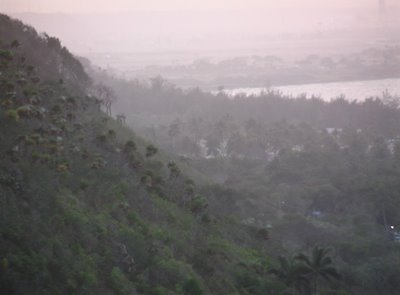
Upon questioning, Vina volunteered that she was Canadian and so was I. They were soon convinced about her, but were not too sure about me. I looked Cuban but spoke no Spanish. But upon closer inspection they discovered I was "Indio", and left smiling.
That was our last evening there, and the next day we headed back to the Canadian winter. Next time we would like to spend a longer time in Havana, and rent a car to drive to other places in Cuba. It is the most interesting country I have been to so far.

Montreal (April 18, 2006) - Another midnight drive to the airport and a wait in the airport for the 7 am flight, made bearable only because we got to sleep in the airport lounge.
We touched down at Veradero on the north shore in the afternoon and in the customs Vina had to part company with 2 oranges and an apple which she brought along.
A luxury bus took us through Mazatlan to Jibacoa our destination on an excellent highway, better maintained than most national highways in India.
The Jibacoa resort is further west of the expansive resorts in Veradero and about 1 hour east of Havana. While Varadero has white sandy beaches the twin resorts at Jibacoa are more seculuded
 with shallow corals just off the white sandy beach.
with shallow corals just off the white sandy beach.The easy access to snorkelling and Havana is what attracted us to Jibacoa.
The entry road to Jibacoa snakes its way between two small hills and arrives at the single storey structure that houses the reception, bar, and the small indoor recreational area.
Our room was being cleaned so we were asked to wait here a while. We went to the bar to get ourselves drinks, and walked out the back exit where it opens up to the beach. It was a most welcome site - the sand and the blue sea. We could see the dark patches were the coral reefs were.
There was a low hill off to the right and another one behind the resort and parallel to the beach. Our restort shared the beach with another one called the Breezes Jibacoa. Just off the tan to white coralline sand beach we could see the dark patches of coral.
The first day we relaxed and luxuriated in Jibacoa. The food was not as spectacular as some of the other resorts, but there was enough of a variety. It was tasty although a bit bland.
It was interesting to see a slightly different attitude in the Cuban waiters and staff as compared to the other resorts in DR and Mexico. The Cubans seemed to always measure you up. Their attitude was not one of universal friendliness but one of "symbiotic fraternity" for lack of a better word. They seemed to say - "Let us help each other by being friendly." Later even when we met several other Cubans in Havana, we noted this more business like, and egalitarian treatment of tourists which made our interaction with people there so much more interesting. Also the fact that each Cuban had strong individual traits and a different approach to even something as univeral as street vending... but more of that later.

On the second day we did more snorkelling and kayaking. The highlight of the day was that Vina got scraped by some shallow coral off the beach and I finally found her at the 2-room nursing station. The doctor seemed highly educated but could barely speak English. He recommened some ointment and tablets which we were supposed to buy. But Vina fished out of her sizeable medical emergency bag which she had brought along with her all the way from Canada, what she thought was a suitable equivalent of the recommended medicine. The doctor was very impressed by this.
We hatched plans to make trip to Havana the next day, stay at a Casa Particular (a bed and breakfast) for a night, and head back to the resort the next day evening.
lOne of the waiters in the dining hall had made a business proposition whereby his friend would come down to pick us up from Havana and drive us there, but we had declined, much to his consternation. We planned to use the local bus, rather than a comfy rented car, but the only buseaving Jibacoa resort wa
 s a worker bus leaving at 8 am., and that too only to the next town 25 km. away. We had to then find our own transportation to Havana from there. We were undaunted by all this, but what concerned us greatly was that we had to get up at 7 am in order to be aboard the bus at 8.
s a worker bus leaving at 8 am., and that too only to the next town 25 km. away. We had to then find our own transportation to Havana from there. We were undaunted by all this, but what concerned us greatly was that we had to get up at 7 am in order to be aboard the bus at 8.And not being morning people (especially on vacations), we found ourselves in a rented car offered by the resort ($60 US) with a driver and his companion heading to Havana the next day at 9 am. It was a pleasant journey, the road dotted with brand new drilling wells that Castro had installed, apparently with the help of the Chinese, that would enable him to no longer depend on tourists like us to fuel his foreign currency requirements.
Our companions were cordial but not overtly friendly.
As we neared Havana the traffic became more interesting with old dilapidated cars and modern busses. Large billboards appeared with interesting messages in Spanish - "Several countries have a high
 percentage of illiterate children, but Cuba is not one of them. Here 100% of our children are educated."
percentage of illiterate children, but Cuba is not one of them. Here 100% of our children are educated."Soon we were in Havana, and the traffic and buildings became spectacular. Ancient cars vied with large ancient buildings for our attention. Imagine the grand edifices in Paris and age them about 50 years and you have Havana. Overall the roads, people and buildings gave a distinctly Indian feel to our expedition, but, of course, with far fewer people.
While driving down the main roads the urban decay was not visible, but as the c
 ar turned into the road where our Casa particular was located, the narrow road, garbage on the sides and the open drain looked like the lower class neighbourhood of any Indian city. The Casa particular itself, though was nice, and so was the interior. The ladies who greeted us (mother and daughter) were pleasant and turned out to be great hosts.
ar turned into the road where our Casa particular was located, the narrow road, garbage on the sides and the open drain looked like the lower class neighbourhood of any Indian city. The Casa particular itself, though was nice, and so was the interior. The ladies who greeted us (mother and daughter) were pleasant and turned out to be great hosts.We parked our bags and immediately set out to explore the city. We were close to the old part of Havana and everything was within walking distance. We walked down the wide bustling concrete promenade at the center of the City called Paseo del Prado, along side which were old dilapidated buildings, modern cigar shops, popular hotels, newly renovated and painted facades of restaurants, and a grand concert hall (Grande Teatro de la Habana) where we saw a ballet competition later that night.
For now though we headed to the Museo de la Revolucion, the former house of Batista, the deposed premier of Cuba. Inside the museum were artifacts from the war. There w
 ere Batista's house hold items, revolutionary literature, newspapers cuttings, weapons, personal belongings, and photographs of the ubiquitous prince of the revolution,
ere Batista's house hold items, revolutionary literature, newspapers cuttings, weapons, personal belongings, and photographs of the ubiquitous prince of the revolution,Che, whose charismatic face is splashed accross Havana, even more than Castro. Also in the Museum are documents and proclamations that seek to amend history and make corrections to the widely held western belief that they are not altogether evil, including a caricature of Bush the Idiot (the senior, not the junior). Right infront of the museum is the historic tank which was used in the battle to oust Batista and beyond it is a wide concrete walkway stretching to the distant blue sky, a strip of sea and the green hill side of an island.

Behind the museum is a structure housing boats, army vehicles, a plane and other remains of the revolution, carefully guarded and displayed.
We walked to the main bazaar from here - the Calle Obispo. This is a pedestrian only narrow street on either side of which are restored buildings, government offices, shops and restaurants. The sight from one end to the other is breathtaking, with colorful Cubans, tourists, and various street side vendors.
We as foreigners have to pay in foreign peso where 1 foreign peso = 1 US dollar, and the locals pay in their local peso which is about 1/40th of the US dollar.
The govenment has apparently clamped down on aggressive vendo
 rs and at night every street corner had a couple of policemen in plain view. Thus it is very safe and hassle free. Interestingly the Cubans are not needy, and in fact we were only discretely approached, maybe 4 or 5 times by people looking to sell stuff. We were solicited in a unique business like fashion, rather than the straightforward pitch that is common to other touristy areas.
rs and at night every street corner had a couple of policemen in plain view. Thus it is very safe and hassle free. Interestingly the Cubans are not needy, and in fact we were only discretely approached, maybe 4 or 5 times by people looking to sell stuff. We were solicited in a unique business like fashion, rather than the straightforward pitch that is common to other touristy areas.While walking through Plaza Vieja - an area with churches, and museums the next day we were approached by a middle aged man in an old suit and a hat who spoke in perfect english (almost a refined British accent) and said, "I am a historian, and if you are interested in learning about these buildings, I can be your guide." I instinctively said, "No thanks." And barely had I said it, he departed. He must have been an educated and intere
 sting man.
sting man.There was another old lady, clad in colorful blue and white with a gigantic cigar protruding from her mouth. While I was taking video on the sidewalk, she just approached us and smiled. No words were needed, but it was an invitation - "Here, take my photo and I wouldn't refuse a small gift". I turned away, and in an instant she had moved on.
That evening we walked to the Malecon which is like a walkway fronting the sea. There are people here fishing off the rocks below, sitting on the wall or some kids playing. One guy caught a fish... some kind of a flat fish that was wriggling. He let Vina hold it for a photo, and said, "Dont worry, I didnt see anything." There was another young girl that Vina spoke to in Spanish who asked where we were from. She asked if we had soap.

After sun set, we walked to the Grand Theatre to watch a ballet performance. We met an east german guy there, who was overtly friendly and chatty. He said this place reminded him about how his old country used to be. He probably felt comfortable there, even though at 6.5 feet and in shorts and backpack he stood out from the dark skinned crowd.
For dinner we went back to Called Obispo where we had Chinese food. It was late and we met a very intersting person here. His job was to drum up business for the local chinese restaurants by wearing a red gown and being a chinese wizard. I invited him for beer, and heard from him the sto
 ry of the real Cuba. He was not scared to talk, because he said the government had become more relaxed over time. There was a time he said when whenever they saw a man talk to a foreigner for any length of time, he was approached by the police later and questioned. They let him off with a warning - "Why do you want to get into trouble?"
ry of the real Cuba. He was not scared to talk, because he said the government had become more relaxed over time. There was a time he said when whenever they saw a man talk to a foreigner for any length of time, he was approached by the police later and questioned. They let him off with a warning - "Why do you want to get into trouble?"This guy was very smart. He said his sister was even smarter and had wanted to join the Navy. She had the brains for it and passed the tough entrance exam. As part of the training she was supposed to be sent to Poland. But when her name came up she was rejected. Why? Apparently before Castro took over their family had a successful business. With the revolution their property was taken away and they were reduced to lower middle class status like everybody else. So it was reasoned that she might have some animosity towards the government and so would be a prime defection candidate.
Our chinese friend was well aware of Cuba's
 future potential if Castro's communism came to an end. He was also aware of the strong arm tactics used by the US to twist central American politics to suit its ends. What he knew about India most was about Indira Gandhi. She was a friend of Castro and they used to show her on TV. He also remembered the day in 1984 when she was killed and on TV they showed the continuous river of mourners who walked past her body.
future potential if Castro's communism came to an end. He was also aware of the strong arm tactics used by the US to twist central American politics to suit its ends. What he knew about India most was about Indira Gandhi. She was a friend of Castro and they used to show her on TV. He also remembered the day in 1984 when she was killed and on TV they showed the continuous river of mourners who walked past her body.Late at night we let ourselves into our Casa Particular and got up late for a sumptuous breakfast. We were joined by a French couple with their 2 sons. One of the items on the breakfast table - a tin of chocolate powder - boasted high carbohydrate content, which would have horrified any weight concious New Yorker.
The casa particular had a high ceiling with an inside courtyard where various pets lived together. Our hosts were christians and had a jesus cross in their house.
We headed out to take in some more sights of the old city. It was a warm sunny day and climbing the steep steps of church bell tower to the top of the Abbey afforded a breathtaking view of the city. Looking towards the sea there were new stylish buildings and harbor f
 acilities, and looking inland we could see the dishevelled roof tops of crumbling concrete structures stretching into the hazy sky, and in the distance the dome of the parliament house.
acilities, and looking inland we could see the dishevelled roof tops of crumbling concrete structures stretching into the hazy sky, and in the distance the dome of the parliament house.A few more museums, more enterprising people offering us a peek into a "restricted area" of the museum for a fee, and finally a flea market where Vina could indulge in some real commerce. From there we headed back to the Casa Particular to collect our stuff and embark on our journey home. This time we were adamant about taking local transportation to go back to Jibacoa. We finally located the bus stop and stood in line with other travellers heading east. We waited for the bus to come, and waited some more. It started to get dark. After a long wait the
 bus came, but then it went into some depot. Our excitement died when we were informed that the bus will take its own sweet time to come out. The sun was setting, and we were losing patience. We inquired about any other way to get back to Jibacoa, and were told that there was no way. But we had been told that a local taxi would take us back to Jibacoa for $40 US/peso. When we asked the locals about the taxi option, they said no way... it costs a fortune... who will pay that. We said, we would, and there was commotion in the long line as people turned around to see who these morons/rich people were. We were told to go near the railway station where there was a long line of dented and dusty cars standing.
bus came, but then it went into some depot. Our excitement died when we were informed that the bus will take its own sweet time to come out. The sun was setting, and we were losing patience. We inquired about any other way to get back to Jibacoa, and were told that there was no way. But we had been told that a local taxi would take us back to Jibacoa for $40 US/peso. When we asked the locals about the taxi option, they said no way... it costs a fortune... who will pay that. We said, we would, and there was commotion in the long line as people turned around to see who these morons/rich people were. We were told to go near the railway station where there was a long line of dented and dusty cars standing.Once there we made our intents known, and again there was a commotion amongst the stander-byes, and a menacing man approached us and said he could take us for $40. We were uncertain about him, so looked around for any others willing to take us, but there were none. Finally we said OK and he went away to make arrangements.
I looked with uncertainity at his car since I had seen much better and modern cars in a junkyard. But the man came back with an even more menacing man who was to be our driver. Our driver had mascaraed eyes and had a red bandana on his head, like the pirate in Pirates of the Carribbean, and kept looking in all directions rapidly as if he at any moment he expected a bird to swoop in on him and grab his bandana. We paid him $40, and he led us to a car which was even more dilapidated than the one I had thought would be our conveyance, and we set off.
We were told to act like Cubans since this was a private vehicle and it was not allowed to carry foreigners. By the time we negotiated the 100 km. to Jibacoa we had passed several policemen on the way and none of them stopped us. But we were lost and could not find the road that leads to the resort. Our driver had no clue. We finally stopped a car with some foreignerns in it and they said to follow them. But thanks to our ancient car, we lost them. We took a road which I thought led to the resort, but very soon the road ended in a mud road and we encountered cows. So we turned back and the driver parked on the side of the road to walk up to a house in the dark. He came back with a man who said that the resort up the road, and who was happy to accompany us there in the car. We made it back, dusty, famished, tired and needless to say - anxious. From the looks of it even the driver was anxious and we parted ways relieved.

That was our biggest adventure in Cuba. Havana was an unforgettable experience, and the Cuban people we met were deep and unique.
The next day I did a scuba dive, but it was not too exciting - saw a moray. Later while snorkelling I saw a stone fish and a barracuda apart from the regular coral fish. Overall the Jibacoa experience was fantastic. We got to relax, do some windsurfing and some sea kayaking. I tried to learn the Bobcat, but with my limited Spanish and my instructors limited teaching ability I almost tipped the boat twice.
The next day we had an interesting incident. We rented bikes and in the evening pedalled for a couple of hours along the road towards Havana, just to see the rugged coastline and the setting sun. We came accross a creek emptying into the sea and decided to take some photos. So we rode our bikes in the grass and parked under some trees and walked to the sea.
It should be mentioned that this piece is land is closest to the Florida coast and many people have made their way accross. Probably this fact was foremost in the policemen's minds as they were driving in the car and spotted our bikes near the creek. One of them got off near the creek, and the other drove his car further down and turned on the dirt road to cut off our exit if we attempted to flee in that direction.

Upon questioning, Vina volunteered that she was Canadian and so was I. They were soon convinced about her, but were not too sure about me. I looked Cuban but spoke no Spanish. But upon closer inspection they discovered I was "Indio", and left smiling.
That was our last evening there, and the next day we headed back to the Canadian winter. Next time we would like to spend a longer time in Havana, and rent a car to drive to other places in Cuba. It is the most interesting country I have been to so far.